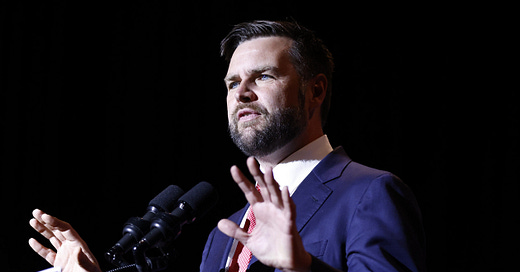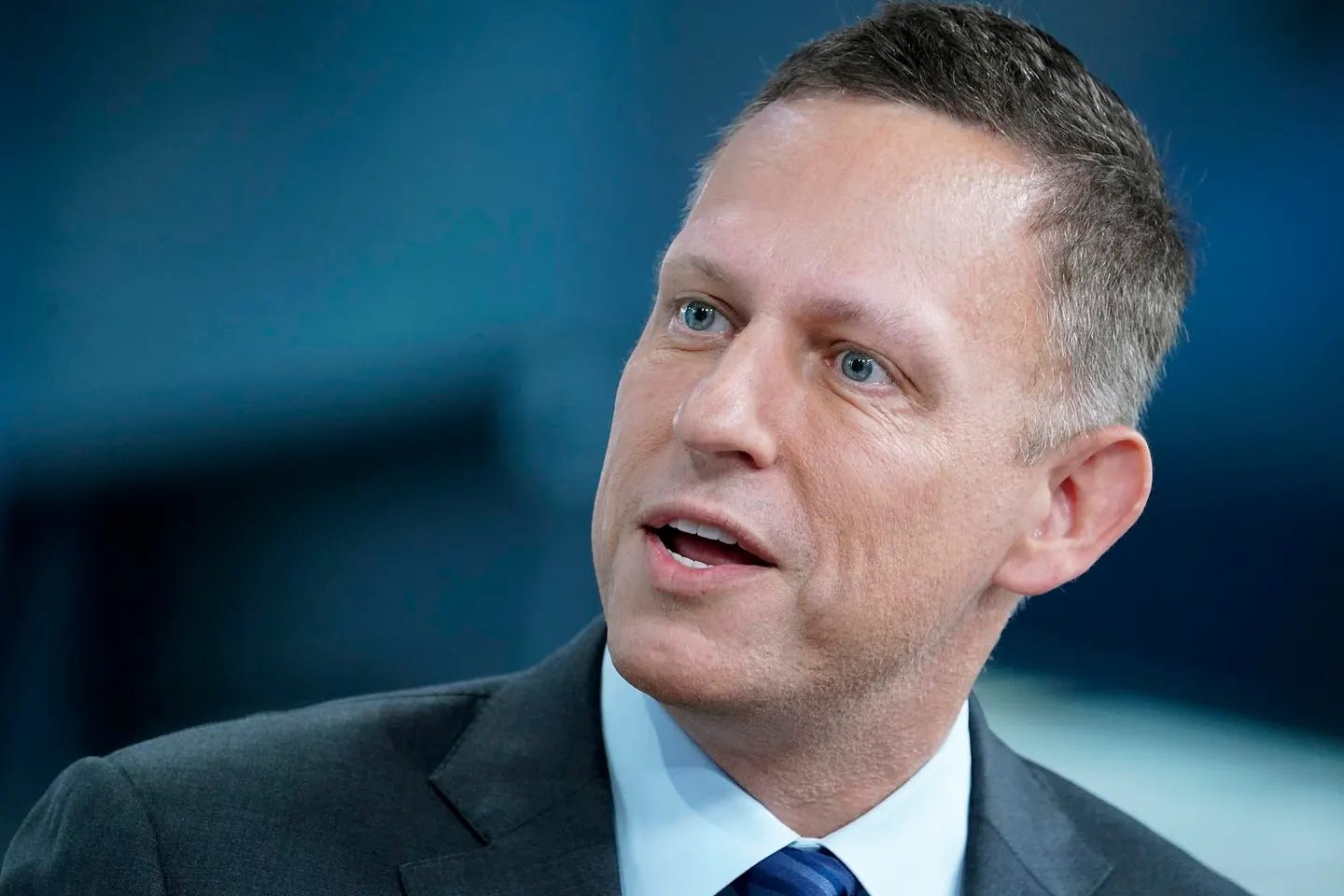TOTS Special Edition: JD Vance, Peter Thiel, and the Online Conservative Movement
The darker undertones of JD Vance's political origins
Hi folks, happy Sunday.
Recently, my writing has been focused on the Democrats, and with good reason: That’s been the more chaotic party as of late (if only slightly). But with the party coalescing around Kamala Harris at a rapid pace, the focus has slowly shifted back on the Republicans, and their new introduction to the national stage, Ohio Sen. J.D. Vance.
It’s going… well, it could be going better.
Back in June, before American politics as we knew it were irreversibly changed, I wrote an article about the various options for Trump’s running mate. Vance was the second candidate I wrote about in that piece, with the assumption that he had strong odds at being the VP. For a number of regular readers of this blog, I learned that that piece was actually their initial introduction to J.D. Vance. I won’t rehash his whole backstory here (Read the OG article if you want), but I will share with you how I answered the question of “Does J.D. Vance help Trump win?”
“Frankly, no. There are some who might argue that Vance, a young, intellectual conservative who has embraced the new side of the party is the ideal compliment to Trump. But that argument fails to address a key fact: In general, the most Trumpian candidates who aren’t Trump haven’t done well in swing races (Just look at 2022). Even Vance, who won his race in now reliably Republican Ohio, is an example—Vance did by far the worst of any statewide Republican in Ohio in 2022, the only one to not win by double-digits. Vance’s full-throated embrace of populist rhetoric has earned admirers on the right, and even some unexpected alliances in the Senate, but that hasn’t overcome his personal issues as a candidate, or the general rejection of getting too into the culture war by voters. And just to be frank, as a Twitter (X) addict myself, Vance is what we call ‘too online.’ Trust me.”
There’s a lot there, and a lot of it has come to the surface in the last few weeks. Today I want to talk about J.D. Vance’s weaknesses, particularly that last point. But I also want to talk about where he, and the new wave of thinkers like him, are coming from.
Vance: An Electoral Underperformer
This doesn’t totally fit with the rest of the article, but I do believe it’s important to note that Vance, in his limited history, has actually been pretty bad at the whole elections business.
Vance was elected in 2022, beating Congressman Tim Ryan (D) 53-47 in a race that was considered Republican-leaning through the cycle. On one hand, that’s not very close, and Ohio is still viewed by a lot of the public as a key swing state. But the truth is, that’s not the case at all. Ohio easily went to Trump twice, and Republicans hold all of the statewide elected offices outside of longtime Sen. Sherrod Brown’s Senate seat (And that could change very soon).
When you look under the hood, Vance’s performance looks a lot weaker. Time for one of my favorite things: Data! It’s hard to really ask, “Ok, how many Ohioans voted for a Republican in 2022, and how many voted for a Democrat?” because each race is different and crossover appeal is in part candidate-dependent. However, the closest thing we have to a generic Republican vs generic Democrat race is the combined vote for all Republican congressional candidates vs the combined vote for all Democratic congressional candidates. Nationally, Republicans won the combined vote 50-47. That’s close, but was just enough to win them the House.
BUT in Ohio, Republicans won the combined vote by around 12 points (Rounds to 56-44). That’s a big gap! That means that at least as far as the House vote goes, Ohio voted 9 points to the right of the nation as a whole, which is about what you’d expect for the state. But Vance only won by half that: 6 points, about 3 points better than the Republican House vote nationally. Now again, a Senate race is a different animal, and I’m not trying to pretend these things are perfect comparisons. I’m just trying to illustrate the point that Vance performed poorly compared to Republicans as a whole.
Now let’s compare it to Trump! In 2020, Joe Biden won the popular vote over Trump 51-47, while Trump won Ohio by a margin of roughy 53-45. So, the nation was as a whole was bluer in 2022, and yet Trump *still* won by more than Vance did in 2022. Trump did underperform the Republican House vote as well (Again, the House-Senate comparison is a little shaky), but I think the point I’m trying to make is clear.
Looking at the other state row offices in 2022, Vance *really* sticks out. Here are the other statewide results that year:
Governor: Republican wins 62-37 (A margin of 25 points)
Attorney General: Republican wins 60-40 (A margin of 20 points)
Secretary of State: Republican wins 59-40 (A margin of 19 points)
Treasurer: Republican wins 59-41 (A margin of 18 points)
So, no matter how you slice it, Vance underperformed in Ohio in 2022. He underperformed relative to Trump, despite running in a redder election nationally, and he underperformed relative to every other Republican in the state. The smart folks over at SplitTicket created a WAR model-Wins Above Replacement-for political candidates in 2022. They found that all factors considered, a Republican should’ve beaten a Democrat in the 2022 Ohio Senate race by about 11.3 points, which Vance undershot by 5.3%. This meant that Vance, despite winning, had the fourth worst underperformance of any Republican running in a competitive seat in 2022.
It’s worth noting that the 2nd worst underperformer on that list, with an underperformance of 6.6% was Arizona Senate candidate Blake Masters. Masters also underperformed every other Republican statewide (Albeit by a lower margin in a bluer state) and the only reason I bring him up is because he and J.D. Vance have a very similar origin story, which we’ll get to.
Peter Thiel and The New Right
There is a decent chance that for many of you, this is where the article goes a bit off the rails, because the name Peter Thiel doesn’t immediately ring a bell. Don’t worry though, it shouldn’t, because Thiel isn’t a politician, and despite having a tremendous impact on the recent image of the GOP, isn’t really covered too much in the media.
This piece can’t turn into a Peter Thiel backstory, but basically: He’s the co-founder of PayPal and the founder of Palantir Technologies (Data analytical firm). He was also the first outside investor into Facebook. Yes, he is very, very rich. In recent years, Thiel has become well-known in political circles for his donations to far-right figures and his general beliefs. Thiel describes himself as a conservative libertarian—let’s see what that actually means to him.
Thiel wasn't always the biggest Republican disruptor, at least in his candidate choices. An early supporter of Ron Paul in 2008 and 2012, Thiel still become a primary contributor to the McCain/Romney general election campaigns. After briefly supporting Carly Fiorina in 2016, Thiel became an enthusiastic Trump backer, donating over a million dollars to his campaign, speaking at the RNC, and joining his transition team.
But Thiel’s most important contributions came in 2022, when two of his old protegés, Masters and Vance ran for office. Thiel supported 16 congressional candidates in 2022, donating over $20 million dollars to their campaigns. Many of these candidates, including both Masters and Vance, repeatedly questioned the validity of the election. But it’s particularly the two of them that are of interest, considering both their closeness to Thiel and his $10 million donation to each of their campaigns.
Peter Thiel’s ideology helps us understand a lot about where J.D. Vance gets his: Vance was a young man when he moved to the Bay Area and began working with Thiel. He had not yet started any bid for office in 2016, although he had risen to national prominence for his book, “Hillbilly Elegy.” Vance worked for Thiel’s Mithril Capital, and remained close to the billionaire even after leaving for Ohio.
So, what does Peter Thiel believe, and what is the “New Right”? Looking into Thiel’s background reveals some concerning beliefs that explain a lot about J.D. Vance’s own rhetoric. In the mid-90s, Thiel published his first political writings, which largely focused on issues in higher education. Thiel criticized affirmative action, using many of the arguments that you’ll hear from conservatives today. In a 1996 Stanford Magazine article, he writes “Originally conceived as a means to redress discrimination, racial preferences have instead promoted it. And rather than fostering harmony and integration, preferences have divided the campus.” Thiel offers a serious criticism of the attempt to push multiculturalism on college campuses in this, and several other writings from the time.
In 2004, Thiel wrote “The Straussian Moment.” The essay is really long and actually a very interesting summary of this new conservative viewpoint, so while I do recommend reading it if you’re curious, I think it can be summed up in a more concise manner here. The essay starts off with the following: “the twenty-first century started with a bang on September 11, 2001. In those shocking hours, the entire political and military framework of the nineteenth and twentieth centuries, and indeed of the modern age, with its emphasis on deterrent armies, rational nation-states, public debates, and international diplomacy, was called into question.” This gets into a lot of philosophical stuff, but in essence: Thiel argues that in the wake of 9/11, modern ideology and systems need to be changed: “One may define a ‘liberal’ as someone who knows nothing of the past and of this history of violence, and still holds to the Enlightenment view of the natural goodness of humanity. And one may define a ‘conservative’ as some- one who knows nothing of the future and of the global world that is destined to be, and therefore still believes that the nation-state or other institutions rooted in sacred violence can contain unlimited human violence.”
In 2009, Thiel wrote another essay, “The Education of a Libertarian,” where he writes that “Most importantly, I no longer believe that freedom and democracy are compatible.” The essay, to be quite frank with you, is the kind of something someone who spends too much time online writes, and gets pretty nerdy, but that quote is key from a guy who has gone onto endorse election deniers and influence the potential future Vice President. Thiel also writes that “In our time, the great task for libertarians is to find an escape from politics in all its forms — from the totalitarian and fundamentalist catastrophes to the unthinking demos that guides so-called ‘social democracy.’”
This idea has since been taken to its logical extremes by “neo-reactionaries,” many of whom argue for a return to authoritarian forms of government and traditional power structures rather continue the acceleration of Western Democracy, which many of these thinkers feel has failed to provide freedom. One such thinker is Curtis Yarvin, who also happens to be a personal friend of both Thiel and Vance. Now, there is so much I could get into here, and this is frankly just a whole rabbit hole on its own, but simply put, Yarvin makes Thiel look like a political moderate. Yarvin has been quoted saying things such as “Washington has failed. The Constitution has failed. Democracy has failed,” and “It is time for restoration, for national salvation, for a full reboot. We need a new government, a clean slate, a fresh hand which is smart, strong and fair.” My favorite term for his ideology? “Neo-monarchist.” These are, simply put, people who believe that democracy has been failing from the very start.
Why You Should Care
Now, I know what you’re thinking. “Dude, these are just some online weirdos. No one listens to or cares about these guys.” But that’s the issue! People do! Important people! The right-wing of the United States has changed, folks. Back in 2017, Politico reported that Trump adviser Steve Bannon started reading Yarvin's blog, and had passed off information to the White House (A story Yarvin has denied). And while Yarvin, Vance, and Thiel are close, I do not believe Vance is a neo-monarchist or reactionary or whatever. Generally, most Americans indeed approve of democracy.
But there’s a quote—”you are the average of the people you spend the most time with.” Now, I’d like to imagine these guys spend more time with their families than in their very strange bookclub, but the point is who the potential next Vice President of the United States associates himself with. It’s not like these are old, long-lost friendships—Vance just got $10 million from Thiel to help win a Senate seat, and all three of them were covered at NatCon 2022, a new-right conference funded by Thiel. And it’s not just Vance and Masters—Thiel has given to senators like Ted Cruz and Josh Hawley, who in turn have peddled their own far-right conspiracies. In the previous article, Vance cites Yarvin as a political influence.
The writer also mentions a podcast later in the article, where Vance is quoted saying “We need like a de-Baathification program, a de-woke-ification program,” and “I think that what Trump should do, if I was giving him one piece of advice: Fire every single midlevel bureaucrat, every civil servant in the administrative state, replace them with our people.” On an unrelated note: Project 2025. Vance is only 39. He is the first Millennial on an American presidential ticket. He is a frequent internet user. This is new to our politics and our media, but we all know the internet is a hotbed for extremism. Vance is a guy who chills in X group chats with far-right teenagers and GOP activists. And now, he has the direct ear of the man who could be months away from once again becoming the most powerful person in the world, and is already looking for revenge over his past election losses.
I’ll end this section with another Vance quote: “If we’re going to push back against [Idk what to say here, wokeness?], we’re going to have to get pretty wild, and pretty far out there, and go in directions that a lot of conservatives right now are uncomfortable with.”
I’ll be back on Tuesday. Please like + share, subscribe if you have not (Seriously??), and stay safe.








The more I learn about the alt right, the more they scare me. The GOP truly has sold its soul.